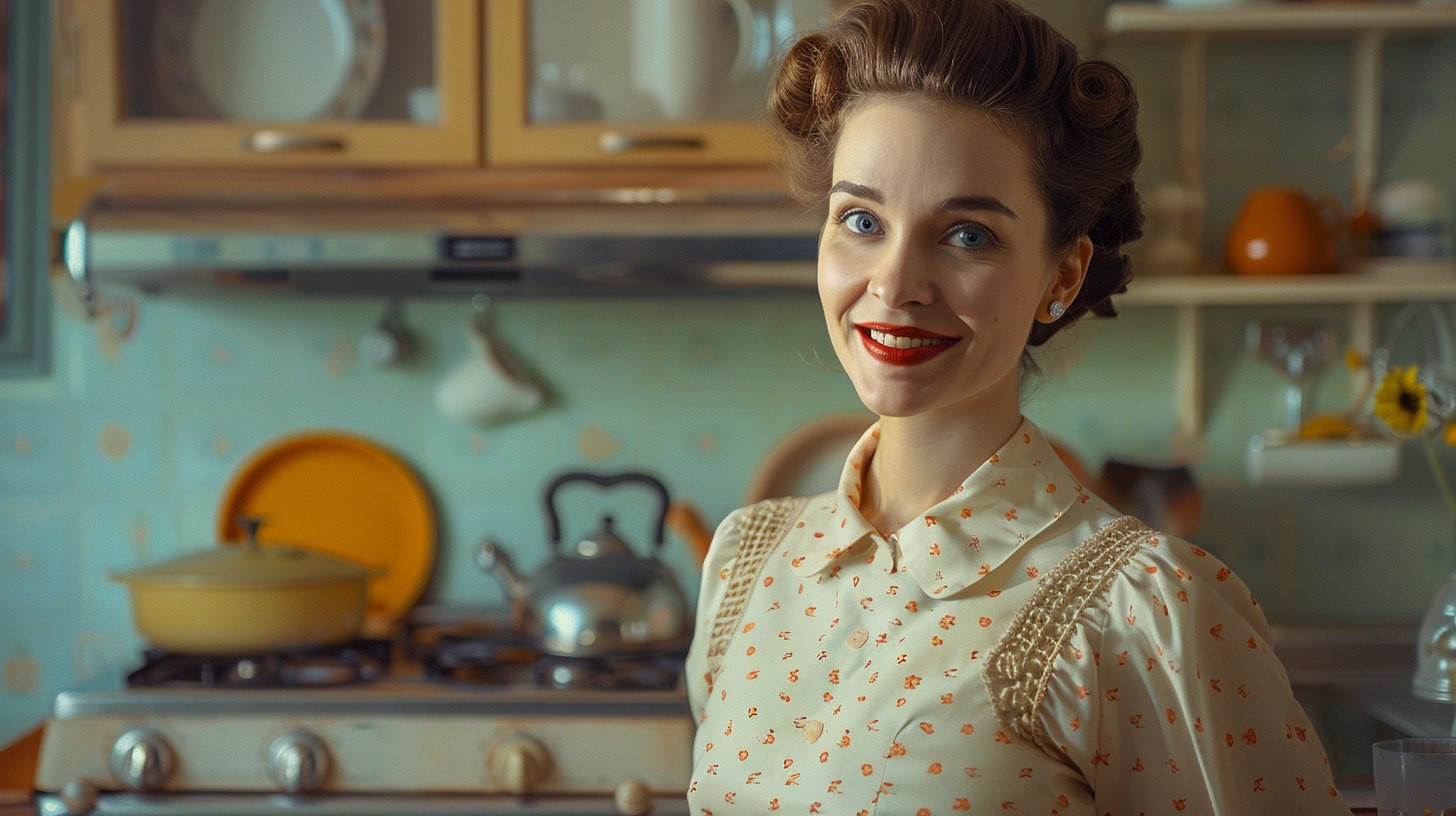Science
The Sun’s Ring of Fire and a Planetary Parade: A Captivating Celestial Show
13 February 2026

Feminism has empowered women to drive tractors, opened doors to technical universities, and now encourages them to learn to code. In today’s world, a woman can pursue any profession she desires. Who are the women who forgo the opportunities feminism has provided and choose to become “trad wives” – traditional wives?
Alexia, an influencer known on TikTok as @lex.delarosa, starts her day by baking homemade crounchy flakes with cinnamon for breakfast. Dressed in a white robe, with perfectly styled hair and makeup that mimics a natural complexion, she holds a few-month-old baby patiently waiting as she mixes, rolls, and bakes the dough. When her infant “requests” chocolate cocoa puffs, instead of rushing to the store, she blends cashews and homemade nut cream. If necessary, she would even make crayons by hand.
Alexia distances herself from the term trad wife, as she does not want to be pigeonholed, but her videos have become emblematic of the trend. The new, popular term on social media, trad wife, describes a very old phenomenon – a woman who forgoes a professional career to fully dedicate herself to raising children and managing the household. The modern traditional woman differs from the 1950s housewife in that she consciously chooses the traditional gender role division and finds fulfillment in it, believing that her decision is entirely compatible with feminism. After all, wasn’t feminism primarily about providing women with the freedom to choose?
Women like Alexia fully embrace their role. Cooking dinner and ironing her husband’s shirt is just the beginning – these women bake bread, maintain home gardens, raise chickens, sew clothes for the entire family, and most importantly, always look impeccable from morning to night. The traditional wife lifestyle is far from the stereotypical “stay-at-home mom” image – it’s about flawless hairstyles, perfect makeup, minimalist interiors that sparkle with cleanliness, and aesthetically pleasing activities in nature. Like many social phenomena, the role of the housewife has been redefined to align with the spirit of capitalism.

Until recently, non-working women were often seen as parasites – receiving child benefits “for nothing,” parading with strollers through shopping malls, and begging for free items “for their sick daughter.” The vision of the traditional Matka-Polka (archetypal Polish Mother) is unappealing: a neglected, unkempt woman, lost in the perpetual chaos of daily life, sleep-deprived, and, above all, exceptionally uninteresting. After all, what else do mothers talk about – diapers and kindergarten enrollments?
Today, being a housewife is associated with luxury. How many households can afford for one of their adult members to give up work? The idea of being a traditional wife is alluring, often linked with the concept of a soft life. This means a life free from significant responsibilities, stress-free, and healthy. A life with room for interests, passions, and spontaneity. It signifies opting out of the rat race and rejecting a culture that demands constant forward momentum. Leaving a professional career for the sake of family and home offers the promise of time for morning yoga, midday walks, and green smoothies with parsley from one’s garden.
Of course, any woman who has had the opportunity to take care of children and the home full-time knows that reality is vastly different from the colorful world of Instagram influencers. Parenting also involves sleepless nights, slobbered-on clothes, and walls scribbled with crayons. Nonetheless, the vision of fully focusing on motherhood can be appealing to women. It implies a reduction in the pool of responsibilities – at least those related to professional work. And that is already significant.
We recommend: Not Just Welfare Kings and Queens: Large Families in the World of Stereotypes
The primary goal of second-wave feminism was to bring women into the workforce, granting them financial independence and enabling self-actualization. In her 1963 book, The Feminine Mystique, Betty Friedan addressed “the problem that has no name” – a wave of depression and nervous breakdowns among women who were relegated to the role of housewives. According to Friedan, women were assigned the role of the home caretaker, naturally inclined to devote themselves to their families. Yet, each woman desired more. Only by rejecting the role of housewife and engaging in professional work could women become part of society and attain full personhood.
Feminism helped women step out of the kitchen and away from the vacuum cleaner, but it overlooked the other side of the coin. Men were more than willing to shed the burden of being the sole financial provider for the family but did not rush to share household chores and childcare responsibilities. Women were left with a double shift, and to this day, no country, no matter how progressive, has achieved complete equality in the distribution of domestic duties or parental leave.
Trad wives have only two responsibilities. First, they must manage the home and care for the children. Second, they must look impeccable and pretend that their work requires no effort. Modern women, who have been told that fulfillment lies in “having it all” – a professional career, children, and a clean home – sometimes just want to rest. For many women who give their all both at work and at home, the role of a traditional wife could mean halving their responsibilities.

One does not need to be an alpha woman to feel the stress associated with work and the current market situation. The economic crisis has become the default state of reality. It is accompanied by inflation, unemployment, rising living costs, and real estate prices. We fear that even if artificial intelligence does not take our jobs, a Generation Z individual, raised with an iPad in the crib, will, perhaps by exposing our old Gadu-Gadu messenger status to the world from middle school. Add to this the prospect of climate apocalypse and nuclear war, and we have a complete picture of an entire generation raised in stress.
Paradoxically, the COVID-19 epidemic reminded us that things could be better and that we could pause for a moment and focus on the present. Suddenly, we started baking bread and growing kombucha mushrooms in jars. It turned out that we did not miss traffic jams and street noise. Instead, we dream of a picturesque house, surrounded by forests and lakes, somewhere in the mountains or Podlasie. When offices closed, we could slow down for a moment and imagine what our lives would look like without professional work, or at least without commuting, with a laptop on our lap, under a blanket.
The work of a traditional wife is entirely remote – in the “office,” we only meet people we are closely connected with. We do not have to engage in idle chit-chat or stare at the screen, pretending to be busy. We do what is required of us, and when we are done, we can enjoy free time without anyone accounting for it. As a housewife, we cannot be fired. Our husband cannot take away our Christmas bonus. Well, unless he takes it away, divorce us, and holds us accountable.
We recommend: Back to Basics: Why We Need Second-Wave Feminism Today
Who wouldn’t want to experience the “soft life” of a traditional wife, rolling dough for cereal flakes and making homemade nut cream? However, while every job entails some level of instability, the occupational risk here is particularly high – in the event of a divorce, a woman finds herself on the job market with a gap in her CV, lacking resources, experience, and prospects. Even in a successful marriage, she cannot count on a pension, and in case of her husband’s financial troubles, both are left stranded.
A housewife is ultimately an employee of her husband. And as is well known, an employer pays, thus he demands. The husband often controls the finances, scrutinizes his wife’s expenses, and tries to influence her household management. A woman fully supported by her husband cannot expect him to participate in domestic chores, even during holidays or weekends. This means her work never ends.
Moreover, few men today can afford to maintain a traditional wife. Modern boys, idolizing figures like Andrew Tate, dream of a traditional woman – one who cooks, cleans, and is a virgin. Yet, they shy away from “gold diggers” who seek men with resources – mainly because they lack those resources themselves. One cannot exist without the other. As long as the economy does not allow for maintaining a household on a single income, and culture dictates splitting the bill on dates, trad wives will remain a rare – and costly – phenomenon.
Translation: Klaudia Tarasiewicz
Polish version: Fenomen trad wife – czy nowocześni mężczyźni marzą o tradycyjnych żonach?
Science
13 February 2026

Science
13 February 2026

Science
12 February 2026

Zmień tryb na ciemny